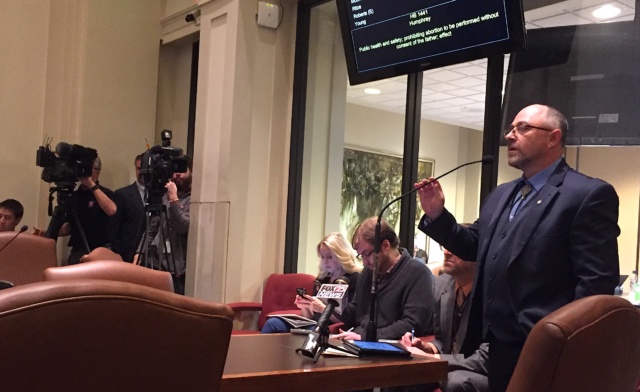
In an effort to prove its irrelevance to the daily lives of Oklahomans, the Public Health Committee of the State House of Representatives passed two abortion measures Tuesday ostensibly designed to make it harder to obtain an abortion in the state.
The first measure would prevent a woman from obtaining an abortion without first producing written consent from the father. The second would prevent a woman from obtaining an abortion strictly due to the presence of a “viable genetic abnormality.” Both would have little impact on the already shrinking number of abortions in our state. Both would place significant intrusive powers in the hands of the government.
As a person who believes that life is sacred, that the life of unborn children deserves protection, and that in many situations there is an alternative to abortion that can satisfy the needs of both the mother and the child, these two measures are infuriating.
Oklahoma’s abortion rates already falling
There are several reasons these bills should never have been heard by the committee — and certainly not passed. First, let’s throw a little reality on the significance of abortion in our state.
The largest number of abortions performed in one year was 13,100 in 1985. This constituted 25 percent of live births that year. Comparatively, in 2015, the most recently available data show there were 5,120 abortions (less than 10 percent of live births) in Oklahoma. Significantly, there has been a steady decline in abortions since 2008, and the last year abortions reached 10,000 was 1991.
Those who are pro-life are probably unaware of these statistics, even though they represent tremendous progress on the issue. Indeed, more women are choosing to have their children than in previous years. This trend has been accomplished without the state passing draconian legislation such as these two bills.
Enforcement impossible for proposed abortion bills
Second, there is no evidence either of these bills would reduce the number of abortions. This is because enforcement of either measure, to be effective, would be outrageously intrusive.
How will the consent be validated? Will there be a required paternity test? Who will bear the cost of such test? Or, how will it be determined if an abortion was performed “solely because the unborn child has been diagnosed with either a viable genetic abnormality or a potential for a viable genetic abnormality.” Will this law impact women who have miscarriages? Who will be tasked with monitoring these? How will they do so?
These bills would require a level of state intervention that should be anathema to anyone who believes in individual liberty.
Abortion quest seems obsessive
Finally, both bills are patently unconstitutional, but the Legislature is rarely concerned about the constitutionality of what it passes — especially when it comes to abortion.
A 2014 law in Oklahoma requiring an abortion doctor to have admitting privileges at a hospital was struck down just last December. The Legislature even drew a veto from Gov. Mary Fallin at the end of last year’s session over legislation that would have made performing an abortion in the state a felony punishable by up to three years in prison and the possible loss of the doctor’s medical license.
To say that the Legislature is obsessed with this issue might not be too strong of a description.
Shouldn’t pro-life people support them anyway?
As a pro-life individual, why would I oppose such legislation? Here again, there are multiple reasons. First, as a pro-life supporter, I want only legislation passed that will accomplish the goal of valuing life and effectively protecting it. Neither of these bills accomplishes those goals. As mentioned above, neither would necessarily prevent any abortion that is currently legal.
Second, when the Legislature overreaches, when it passes patently unconstitutional measures, it only discredits the pro-life movement. We must accept that there are constitutional limits to achieving what we want. Constantly forcing the state to defend the resulting lawsuits — and losing — doesn’t advance the cause. It significantly hurts it. Having a supermajority in the Legislature and the governor’s mansion does not mean pro-life legislators can simply ignore legal precedent on this issue. Their cause would be better served by practicing more restraint on the issue.
In addition, although I would like to see a day when abortions were neither necessary nor desirable, I am skeptical about the ability to use the law to achieve such a condition. There simply are too many grey areas relating to this issue. Areas in which granting the government the power necessary to protect the life might be more harmful to the overall welfare of society (i.e., the individuals who live in our communities).
More importantly, our Legislature should be dealing with other issues. We have a nearly $900 million budget shortfall, are in desperate need of significant education reform, must reform our criminal justice system, and need to reform our tax code and encourage business formation. At this time, these are much more pressing issues for our citizens than abortion. Voters deserve legislators who are focused and dedicated to addressing the real issues facing our state.
Abortion bills illustrate lack of leadership
This latest abortion push and the passage of these bills out of their committee leads to one troubling fact: There’s a significant lack of leadership and discipline in the House.
Rep. Mike Ritze (R-Broken Arrow) is chairman of the House Public Health Committee. He should have never allowed either bill to be heard, and it’s within his power to do so. If he was unable or unwilling to exercise this amount of control, House Speaker Charles McCall (R-Atoka) should step in and insist on it.
With serious, pressing issues facing the state, moving bills such as these out of committee simply gives the impression that the Legislature is disingenuous about serving the people.
And that, unfortunately, may be the most important insight to take away from this episode.






















